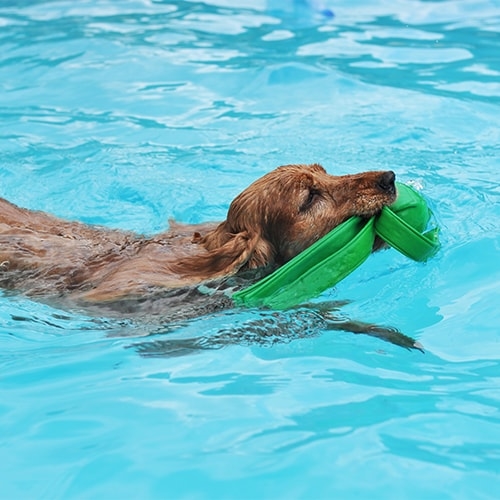| Size | Medium |
|---|---|
| Average height | 38-41 cm |
| Average weight | 13-14.5 kg |
| Average lifespan | Over 10 years |
| Minimum exercise (per day) | 1 hour |
| Coat length | Medium |
| Minimum cost (per month) | £80 |
Cocker Spaniels are lively dogs who love to play. They're known for being 'happy' dogs because their tails are always wagging! Although originally bred as gun dogs, Cocker Spaniels have become popular family pets.
Cockers are very people-oriented dogs who love to have company with them all day. They’re very adaptable and suit city living just as well as countryside as long as they have somewhere safe and secure they can run about (and have lots of playtime with their owner, of course).
Common health problems in Cocker Spaniels
Cocker Spaniels can be great pets for the right owners no matter where you live and are known for being really sociable. Unfortunately, like so many other purebred dogs, they are at risk of certain problems and conditions relating to their breed.
If you are thinking of buying a Cocker Spaniel puppy, make sure the parents of your puppy have had the relevant health screening to reduce the chances of your puppy being affected by certain conditions. We’d recommend looking for a Kennel Club Assured Breeder as they meet extra requirements which will benefit your puppy’s health.
- Hip dysplasia – where the hip joint doesn’t fit together perfectly, which will eventually lead to arthritis. Before breeding, dogs should be screened by x-rays through the BVA/Kennel Club Hip Dysplasia Scheme.
- Atopy – allergies causing itchy skin and ear infections.
- Ear problems.
- Eye problems, including inherited conditions which there is BVA/KC testing for.
- Some auto-immune conditions.
- Inherited conditions, including familial nephropathy, adult onset neuropathy and acral mutilation syndrome. There is CombiBreed health testing available for these conditions.
If you want to minimise the risk of your dog getting problems due to exaggerated features, you can read our advice on choosing a pedigree dog.
Caring for your Cocker Spaniel
Cocker Spaniels are lively dogs and suit fairly active families with plenty of time for playing. They’re clever dogs who love to please and so can be easy to train in the right hands. They’re known for being friendly if properly socialised with other dogs and people. Cocker Spaniels are a popular choice of breed for first time owners because of their gentle natures.
Like most dogs, your Cocker will prefer to have company all the time. Without the right amount of stimulation and company, your Cocker Spaniel will likely try to entertain themselves – which might involve some of your furniture and belongings falling victim to nibbling and chewing.
Cocker Spaniels and barking
As with any dog, your Cocker Spaniel is likely to vocalise and how much noise they make is down to each dog’s individual personality. This said, if your Cocker doesn’t have enough to do and they start to feel bored, they are more likely to bark to let you know. As they prefer to be around people, you may find your Cocker Spaniel barks while you aren’t home (or at least, your neighbours will let you know!). If you’re having problems with excessive noise or barking, we recommend seeking the advice of an accredited behaviourist.
Training and socialisation
Cocker Spaniels were originally bred as gun dogs, so they’re particularly good at retrieving. They’re intelligent dogs with a real willingness to learn, so starting positive, reward-based training from an early age will be of benefit to you and them! Remember they pick up bad habits just as quickly as good, so training needs to be consistent throughout their life. If you’re a first time owner or don’t have much experience of the breed, you may want to go to training classes with your dog. You can find your nearest online.
Socialising your Cocker Spaniel from a young age with a variety of people, dogs and experiences will help them develop into a confident and happy adult. They are a sociable breed by nature so you might find they like to say hello to everyone and anyone out and about.
Cocker Spaniels are known for suffering with separation anxiety, so it’s best to have someone with them during the day. It’s important that your Cocker is never left alone for more than four hours, but even this may be too much for your dog to handle. You’ll need to teach them that it’s OK to be alone for very short periods from a young age.
Exercise

Despite their smaller size, Cocker Spaniels still need a good amount of exercise every day to keep them active, healthy and stop them getting bored. They’re more than happy to go out walking a few times a day and love any opportunity to play with their owner. You may find that if your dog comes from parents bred to work, they’ll probably need more time to run around than your average Cocker Spaniel.
Your Cocker Spaniel will need a minimum of an hour exercise every day. This should be spread across the day and have a few walks in with lots of opportunity to have a good sniff around. They’ll also need off-lead exercise in a secure area so they can run off their excess energy. As well as this, they will also need lots of playtime with you and will really enjoy training sessions and games to challenge them.
Cocker Spaniels are quick and agile, so tend to do well at agility – have a look online to see if there is anywhere local you can take your dog to train them.
Grooming
Cocker Spaniels are high maintenance when it comes to grooming. They need a daily brush to stay on top of dead hair and stop their fur from tangling. You may want to give them a quick brush after their walks, too, to make sure there’s nothing stuck in their fur. You may need to take them to a professional groomer every three months to get them clipped as this will keep their coat in good condition and keep your dog comfortable if you have a ‘show’ variety. ‘Working’ varieties tend to require less coat maintenance so grooming visits will be less frequent.
Your Cocker Spaniel may need the occasional bath if they get particularly dirty out on walks (especially in winter if they decide to ‘explore’ a muddy puddle). Remember to use a dog-safe shampoo and ask your vet if you need any advice.
Cocker Spaniels and children
Due to their patient personalities, Cocker Spaniels tend to get along well with children which is why many families choose the breed. Always supervise your Cocker Spaniel with children and vulnerable adults to avoid any accidents. While they are small dogs they can be a bit excitable, so try to keep playtime with children as calm as possible and know when to step in if they get over excited.
Cocker Spaniels and other pets
Cocker Spaniels are very sociable by nature, so as long as they have been well-socialised from a young age they’ll get along fine with other dogs and even enjoy spending time with them. If you already have a dog and are thinking of getting a Cocker Spaniel as well, read our advice on safely introducing new dogs.
If they have lived together from a young age, Cocker Spaniels are usually fine with cats and other small pets. They don’t have a high prey drive so may be able to be introduced to a cat under the right circumstances. Always supervise your Cocker Spaniel with other pets.
Food
Your Cocker Spaniel’s diet will vary depending on their age. You’ll need to feed them a complete, balanced dog food to keep them slim and healthy.
Your vet will be able to tell you how much your Cocker Spaniel should be eating. You should feed them a good quality, commercially available, complete dog food. We usually recommend splitting their daily allowance into two meals. If you give your dog the occasional treat or use treats for training, remember to take this into account and reduce their daily allowance. Treats shouldn’t make up more than 10% of their daily calorie intake as this can unbalance their diet.
You should try to feed your dog at the same time every day to get them into a routine. Remember to leave at a gap after eating and before exercising.
The cost of owning a Cocker Spaniel

You can expect your Cocker Spaniel to cost you a minimum of £80 per month after purchase and set-up costs and over £13,000 across their lifetime.
Costs you’ll need to think about include:
Purchase costs
Adopting an adult Cocker Spaniel from a rescue centre may be a more cost-effective option, with the added advantage of giving a home to a pet without one – check if the rehoming centre you’re looking at asks for a donation for rehoming.
If instead you’re buying a Cocker Spaniel puppy from a breeder, you’ll need to factor in this cost. Beware unusually cheap puppies as they could come from a puppy farm. If you’d like to buy a pedigree puppy, we recommend looking for a Kennel Club Assured breeder. These breeders must do extra health tests and meet high standards.
Set-up costs
- Puppy vaccines – if you rescue a dog, reputable centres will often vaccinate them for you. Remember that ongoing booster vaccinations will be needed to continue their immunity.
- Neutering – you should usually arrange for your dog to be neutered at around six months old, though your vet will be able to advise you exactly when is best. Check prices at your local practice as these will depend on your vet and where you live. Some rescue centres will neuter any dogs they rehome, saving you this cost.
- Equipment – including a collar and tags, lead, harness, dog beds, dog bowls, pet-safe toothpaste and toothbrushes, grooming brushes and toys. Keep in mind that all these will need to be replaced with wear or damage or if your dog outgrows or damages them
Ongoing costs
- Food.
- Preventive healthcare – budget for routine vet visits to help stop your dog getting ill and catch any problems early. They need annual check-ups, vaccinations and regular flea and worming treatments. Check if your vet offers a health care plan as this can help spread the cost throughout the year.
- Vet bills* or pet insurance – if you don’t have pet insurance and your dog needs veterinary treatment for an injury or illness, costs can rapidly mount up. Check what’s covered and what isn’t when comparing policies.
- Accessories – including lots of poo bags, replacing worn toys and grooming accessories, buying doggy toothpaste and any other extras they might need.
Other costs
- Training – basic training is very important and dogs can benefit from formal classes. Some dogs may have, or develop, behavioural problems which might need professional management.
- Boarding – you may also need to budget for boarding or dog sitting costs if you are planning to go away from home on holiday.
- Dog walkers/day-care – you might consider a professional dog walker to keep your dog happy and healthy if you’re unable to get out with your dog enough yourself, or to look after them during the day if you need to be out for more than four hours.
* It’s always better to plan ahead and budget or get pet insurance in case your pet gets injured or unwell. If you are having difficulty with veterinary costs, you can check if you are eligible for treatment at PDSA here.
When you welcome a new dog into your life, consider getting dog insurance straight away before any signs of illness start. This will give you peace of mind that you have some financial support if they ever get sick.
Fun facts
- There are actually two different types of Cocker Spaniel – working and show varieties.
- While cocker Spaniels are super smart, they absolutely love people. Don’t expect to make a Cocker Spaniel a guard dog!
- In 2004, a study was carried out where a Cocker Spaniel named Tangle had a high success rate at detecting cancer.
- They’re a famous breed – Lady from the 1955 Disney film Lady and the Tramp is a Cocker Spaniel.
Getting a Cocker Spaniel
Do plenty of research before getting a Cocker Spaniel. They’re such sociable, loving dogs but ideally need someone around all the time. They fit in really well with family life and are a popular choice for first-time owners, but need plenty of patience and training (which they’ll love).
Rehoming centres
There are plenty of rescue centres across the country where you may find a Cocker Spaniel. Breed-specific rescues that specialise in Cocker Spaniels are also out there. You’ll need to ask any rescue centre about the dog’s history to make sure they will be comfortable in your home. Good rescue centres should let you know of any health and behaviour problems.
Breeders
If you buy from a breeder, make sure your puppy will be well socialised and have all necessary screening tests, health checks and vaccinations. It’s really important that Cocker Spaniel puppies from a breeder get the right early socialisation so always ask the breeder about how they go about this. We recommend looking for a Kennel Club Assured breeder as they meet higher standards. We’ve put together some advice to help you find a good breeder.









